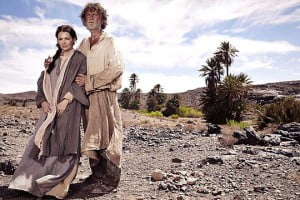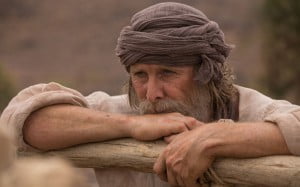How to tell a Bible story: The Ark
 If you want someone to tell a good story, then Tony Jordan is your man. Having left schoolhouse with no qualifications, he has risen to become television'due south number one screen author through his work on Eastenders, Minder, Life on Mars and a host of other hits. He ever had a faith of some sorts, just it was in 2010 when writingThe Birth for the BBC that something inverse; he became convinced that Jesus who was born in this style is the Son of God and that the Nativity story is a 'truthful story' and a 'thing of beauty'.
If you want someone to tell a good story, then Tony Jordan is your man. Having left schoolhouse with no qualifications, he has risen to become television'due south number one screen author through his work on Eastenders, Minder, Life on Mars and a host of other hits. He ever had a faith of some sorts, just it was in 2010 when writingThe Birth for the BBC that something inverse; he became convinced that Jesus who was born in this style is the Son of God and that the Nativity story is a 'truthful story' and a 'thing of beauty'.
The program was then well received that the BBC gave Jordan a blank cheque to do any other biblical story he wanted, and for some reason he chose Noah. Having waited for the response to Darren Aronofsky's moving-picture show of Noah to die down, he went to work and the outcome was shown last nighttime on BBC one.
As I watched, I had two firsthand responses. The kickoff was that it was very well done—the cinematography was very effective, and the characters portrayed with sympathy and humour. The opening scenes, where Noah's sons are taking fourth dimension off when caught by their father, and he switches from an autocratic tyrant to someone who wants to have fun with his children, was nicely done at several levels—catching the viewer off guard whilst besides undermining preconceptions of what it ways to be religious, and a refreshing contrast to Russell Crowe'due south rather inhuman portrayal of Noah in the earlier film.
But the 2nd response followed rapidly on: this was not a historically accurate production. Noah and his married woman Emmie take a postal service-1960s laissez faire attitude to raising their children, completely anachronistic for bronze-historic period civilisation. They are isolated from other communities in their nuclear family, which seems highly implausible. They wear trousers, and utilize fe implements to shape wood for the ark which looks suspiciously like it was just fetched from the local B and Q. And Noah'due south youngest son Kenan (borrowed from the Quran's version of the story) has a suspiciously modern hair cut.
Even more jarring (if that is the right word) is the nature of the discussion and argue. Noah'southward argument with the sinful city-dwellers is cast as a disharmonize between faith and atheism—whether at that place is a god and whether we can know one way or another. In context of course, the story of Noah in Genesis 6–9 has a more interfaith dimension to it, in that information technology is the God of what becomes the Hebrew scriptures that people are ignoring, rather than denying the existence of any deity. At kickoff, the repeated references to 'science' seem very foreign—until you lot realise what Jordan is doing.
 His involvement was never going to be in unearthing the historical context of the story; what is nigh interesting to him is the man dynamic that is either there or lies backside the story, and is what the story is implicitly (or explicitly) virtually. Every bit the Church Times preview highlighted:
His involvement was never going to be in unearthing the historical context of the story; what is nigh interesting to him is the man dynamic that is either there or lies backside the story, and is what the story is implicitly (or explicitly) virtually. Every bit the Church Times preview highlighted:
Like the previous work, it's a typically Jordan pic: kitchen-sink modern in arroyo merely traditional in setting. The characters employ 2022 English language but clothing the swords-and-sandals garb of the standard biblical epic. In that location are dramatic embellishments – notably a son who threatens non to board the boat – notwithstanding the plot is broadly sympathetic to the business relationship in Genesis.
I recall in fact Hashemite kingdom of jordan is existence more than 'broadly sympathetic'; he is cartoon out an important perspective on the story. he was rather scornful of the Aronofsky epic, for just this reason:
I didn't lookout man Aronofsky's Noah, until we had finished shooting The Ark because I didn't desire to be influenced by it in whatsoever way, but as soon equally we were locked I went to come across it. If I'm honest, I was pretty relieved, it wasn't great, merely more importantly it had naught to practice with the story of Noah or certainly non the story of Noah that nosotros were telling.
Instead, Jordan is focussing on the central issue of what it means to have organized religion in God when those around you don't, or decline you considering of it:
To Jordan's mind, the real drama in the Noah story isn't the spectacle, simply the moral question that precedes information technology: what happens when an ordinary man receives a message no one wants to hear? He framed it in typically down-home terms. "I'grand sure my married woman and half-dozen kids love me, only if I started building a boat in the garden, and said God told me everyone was going to dice, they'd get me committed."
Or in his own words:
I decided to arrive a story nigh faith. One man's faith in his God, a wife's faith in her husband and children's faith in their Male parent. What leapt out at me, as a reason to revisit the story, is how a family would react if the Dad suddenly announced he was going to build a big boat in the desert. This was my starting point because it felt real and grounded and took the story back to what I idea information technology was, rather than what it had become, the whole Noah's Ark brand, animals coming in 2 by two was more akin to Peppa Pig than a story of God cleansing the earth of sinful flesh.
In taking this arroyo, Jordan is not but rejecting the free adaptation of Aronofsky; he is also rejecting the literalism of much modern retelling of the story, including its use as a Sunday-school classic. Originally, Jordan wanted to omit both the animals and the flood itself, suggesting the program ended with a shot of a single drop of pelting on Noah'due south hand. That, of course, would have disappointed those familiar with the story, and fifty-fifty the current form has provoked controversy. But focussing on the literal events of the story, as nosotros often do, can actually mean missing its symbolic significance, and its relevance for contemporary readers. I have still to run across a Sunday-school wall display that includes the rotting corpses of the people who died alongside the happy animals tripping out of the ark as the sun shines and the rainbow glows.
 What Hashemite kingdom of jordan actually does in the film is make Noah an 'everyman' of religion. The programme starts and ends with Noah contemplating the dust that falls through his fingers, echoing the cosmos of Adam from the earth and the word that it is to grit he shall return subsequently eating the forbidden fruit. Like Abraham in Genesis 18, he questions the justice of destroying a people when there might be some righteous among them. And like Abraham, he offers hospitality to strangers who come up to the ark, an interesting reworking of the story to make the ark an inclusive invitation rather than an sectional shutting out. Noah preaches in the city after the manner of Jonah in Nineveh (though with a dissimilar upshot), and the location of sin in the city has echoes of the tower of Babel, which follows the story of Noah in Genesis. Like Elijah, he waits for the rain, and at get-go simply sees a cloud 'as big as a man'southward hand' (one Kings eighteen.44). Noah's son acts like the prodigal of Luke 15, and there was even a hint of those who turned away from Jesus in John half-dozen as Noah's sons plow abroad from him one past one.
What Hashemite kingdom of jordan actually does in the film is make Noah an 'everyman' of religion. The programme starts and ends with Noah contemplating the dust that falls through his fingers, echoing the cosmos of Adam from the earth and the word that it is to grit he shall return subsequently eating the forbidden fruit. Like Abraham in Genesis 18, he questions the justice of destroying a people when there might be some righteous among them. And like Abraham, he offers hospitality to strangers who come up to the ark, an interesting reworking of the story to make the ark an inclusive invitation rather than an sectional shutting out. Noah preaches in the city after the manner of Jonah in Nineveh (though with a dissimilar upshot), and the location of sin in the city has echoes of the tower of Babel, which follows the story of Noah in Genesis. Like Elijah, he waits for the rain, and at get-go simply sees a cloud 'as big as a man'southward hand' (one Kings eighteen.44). Noah's son acts like the prodigal of Luke 15, and there was even a hint of those who turned away from Jesus in John half-dozen as Noah's sons plow abroad from him one past one.
In retelling biblical stories, we ever face this fundamental challenge. The social, historical and cultural context of the biblical narrative is frequently a long mode from the context of the contemporary reader. So where do yous pitch your retelling? Practise you place information technology near the context of the original story? That might work well in terms of actuality, but it ways request your viewers to travel a long mode to a place with which they are unfamiliar, and that journey itself can exist a massive distraction. Or practise you, like Jordan, pull the ancient story more closely to present questions and concerns? In this approach, you ask the viewer to practise less work and, hopefully, this means they are less distracted by the distance and tin make connections with what they run across.
It seems to me that this has been the right approach; can nosotros mutter too much about whatsoever retelling of a biblical story which actually makes it engaging? Tony Hashemite kingdom of jordan, from his wide experience of telling stories, is helping us rediscover not just the power of story itself, but how enthralling the biblical stories are. I for 1 will be looking forward to his next retellings.
Much of my work is done on a freelance footing. If y'all have valued this postal service, would you considerdonating £1.20 a calendar month to support the product of this blog?
If you enjoyed this, do share it on social media (Facebook or Twitter) using the buttons on the left. Follow me on Twitter @psephizo. Similar my folio on Facebook.
Much of my piece of work is done on a freelance footing. If you have valued this mail, y'all can brand a single or echo donation through PayPal:
Comments policy: Good comments that engage with the content of the post, and share in respectful debate, can add together real value. Seek first to understand, then to exist understood. Make the most charitable construal of the views of others and seek to learn from their perspectives. Don't view debate as a disharmonize to win; address the argument rather than tackling the person.
Source: https://www.psephizo.com/biblical-studies/how-to-tell-a-bible-story-the-ark/
Enregistrer un commentaire for "How to tell a Bible story: The Ark"